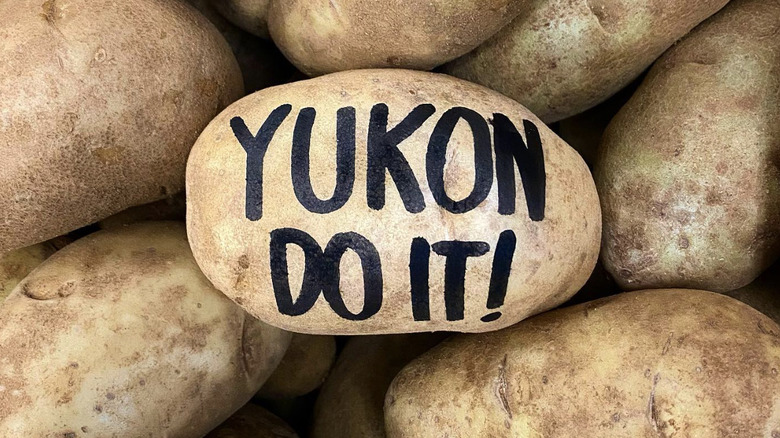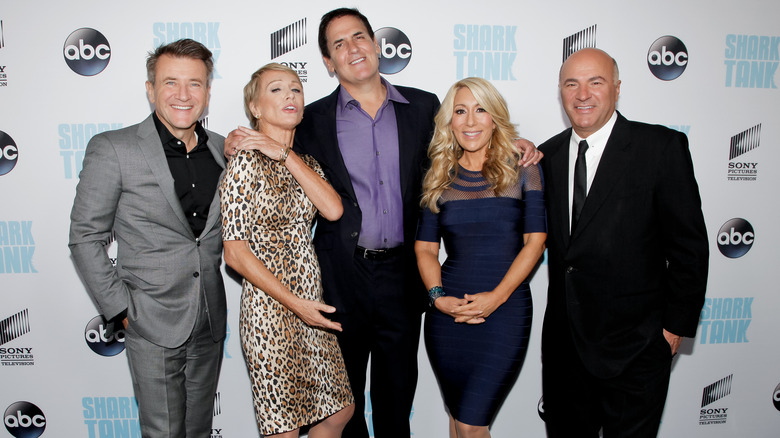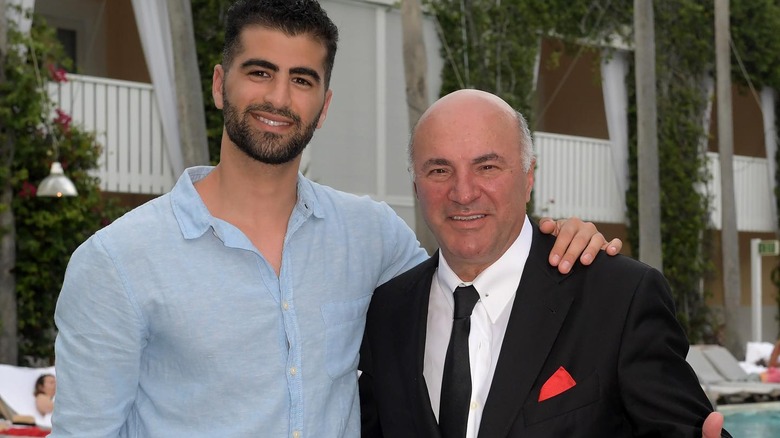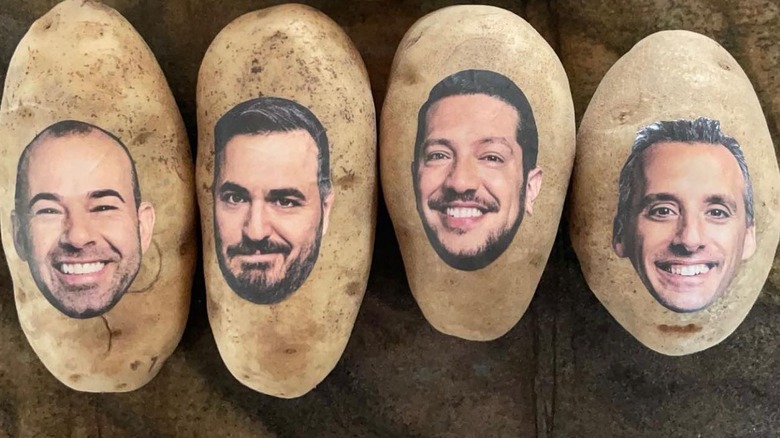Potato Parcel: Here's What Happened After Shark Tank
We may receive a commission on purchases made from links.
With almost $4 billion of potatoes sold in the U.S. in 2021, there's obviously a strong market for earthy, edible spuds. But, what if those potatoes were bound for greetings rather than bellies — a twist on traditional food gifts – and the genius company selling them were pitching the idea on competition show, "Shark Tank"? That's exactly the scenario that played out in 2016, on Season 8, Episode 6 of the fan-favorite investor pitch series.
Potato Parcel founder and "idea man" Alex Craig (who was inspired by a Reddit post of a potato covered in stamps), along with investor and current owner Riad Bekhit, showed up to set dressed as potatoes, drawing a mix of smiles, laughter, and a bit of head-shaking from the panel of sharks. In a curious mix of performance art, demos, and surprising sales revelations, Craig and Bekhit initially held the attention of billionaires Mark Cuban, Kevin O'Leary, Daymond John, Lori Greiner, and Robert Herjavec.
The pitch: a $50,000 investment for a company that takes ordinary brown potatoes and inscribes them with personal greetings, messages, or images used for birthdays, anniversaries, get well wishes, or anything else to brighten someone's day — all for a current base price of $21.99. In fact, the entire business model of Potato Parcel centers on creating personalized spuds and shipping them out for the "most unexpected gift in the mail." The sharks seem shocked that the company existed on a relatively large scale and had landed in their "tank" looking for funding.
What happened when Potato Parcel appeared on 'Shark Tank'?
Simplicity is a key driver for Potato Parcel, but how simple is too much? A few potential "Shark Tank" investors felt that handwritten, mailed potato messages had no longevity, especially from a small upstart that evaluated their company's worth at $500,000. Still, the sharks entertained it as "idea over substance," even though Mark Cuban early on likened the potato messengers to being another form of "stupid on a stick."
The panel then received samples with their faces and apropos messages emblazoned on the potatoes, and founders Riad Bekhit and Alex Craig (dressed as potatoes themselves) also presented seasonal offerings, including a spooky Halloween tater and a holiday ornament.
The Potato Parcel founders had a seemingly big ask: a $50,000 investment for 10% equity in the company. While some of the sharks scoffed at first, the inventors soon revealed some surprising revenue figures. The company had already sold a remarkable 12,000 potato greetings in 13 months, netting $215,000 in sales. However, after some admiration, the sharks started circling, questioning the company's sustainability and jokingly asking, "Do you have day jobs?"
One by one, Cuban, Daymond John, and Lori Greiner opted out, leaving Robert Herjavec and Kevin O'Leary to make offers. Herjavec offered $50,000 for 25% equity, while O'Leary went all-in with the original ask plus a twist: an additional $0.50 royalty per potato for 60 days, increasing to a $1 royalty thereafter until he was paid back $150,000. That sealed the deal for Bekhit and Craig who accepted O'Leary's offer.
Life after 'Shark Tank' for Potato Parcel
By all accounts, Potato Parcel proved O'Leary's hunch that innovative novelty, whether genius or absurd, can pay off. Within two years of appearing on "Shark Tank," CNBC reported incredible viral moments and big sales for the business, with 70,000 potato greetings sold since the episode aired and revenue accelerating past six figures every year.
In 2017, the year after the "Shark Tank" deal, NBA player Dirk Nowitzki of Dallas Mavericks fame created another social media stir for the company by claiming to have received anonymous potatoes in the mail after reaching a long-awaited career milestone.
By 2021, Potato Parcel reached a projected value of $1 million, reeling in more than $700,000 of it since their "Shark Tank" debut. For budding San Francisco entrepreneur Riad Bekhit, who was just 28 at the time and had bought out the company from creator Alex Craig before the duo appeared on "Shark Tank," it was a huge success.
Is Potato Parcel still in business?
Potato Parcel is definitely still in business. While the company was once very active on social media, posts to Instagram slowed significantly in 2024, but the official website is up-to-date and accepting orders. You can even customize a potato through Amazon as well. Potato Parcel still sells the original handwritten potato messages and even more today, including birthday bundles, glitter bombs, cupcake toppers, "big head" cutouts and more. The estimated net worth for Potato Parcel today fluctuates considerably, depending on the source — but investor Kevin O'Leary admits to USA Today he's made "a ton of money" off the peculiar potato deal.
In a 2019 story in the newspaper, in which each "Shark Tank" investor is asked for their "best pitch for the worst product," O'Leary gives that honor to Potato Parcel. He credits its success to the inherent quirkiness, calling it whimsical and funny, and marveling that people are willing to pay $18, more or less, for a potato.
Potato Parcel still centers on its original idea and bare-bones handwritten potato messaging, but Bekhit makes no excuses for that. He told "CNBC Make It" in 2018, "I'm running a wacky business, but it's nothing to be ashamed of ... People respect it and they actually find it really funny."
Bekhit considers Potato Parcel more of a gifting company than a spud enterprise anyway, likening it to greeting cards with innovative packaging, which is why the company has now expanded their product line. This is a good clarification, especially since the company advises against actually eating the raw potatoes.
What's next for Potato Parcel?
There are no reported plans for Potato Parcel to diverge from its original, albeit expanded, business plan. Current 2023 sales and revenues projections for Potato Parcel are hard to come by, with Insider Growth saying the company is worth an estimated $1.75 million, though that can't be corroborated. What we do know is that, by 2018, the company had grown to seven employees and sales of at least 70,000 potatoes, a figure much higher than the 12,000 sold when the company first appeared on "Shark Tank."
Alex Craig, the original "idea man" and potato scribbler (before selling his shares to current owner Riad Bekhit), gave some insight to WFFA-TV in 2015, espousing the idea of chasing after your dreams, even in spite of obstacles. He was a young 24-year-old respectable app developer in North Texas before diving into the potato game. Though, upon revealing the idea to his girlfriend, she called it the 'stupidest idea' she'd ever heard. "You will not sell a single potato," she infamously declared. A year later, Craig was on the "Shark Tank" stage with Bekhit, dressed as a potato and eventually experiencing validation.
As he told WFFA, "I would say the two things that hold everyone back in life is fear and doubt ... The fear of failure and the fear of wasting your time, and the doubt that you can actually achieve something big on a huge scale."





